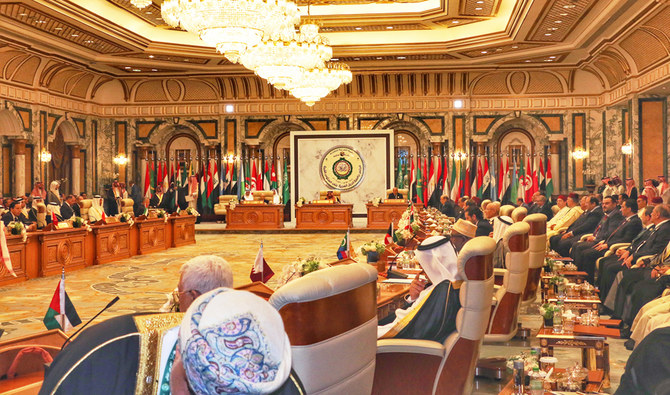JEDDAH: Arab and Muslim states rallied solidly behind Saudi Arabia on Friday as King Salman presented a foolproof case against Iran for its "criminal" actions in the region and beyond.
King Salman told an emergency Arab summit in Makkah on Friday that decisive action was needed to stop Iranian "escalations" following attacks on Gulf oil installations.
A joint statement issued by Arab leaders condemned "acts by the terrorist Houthi militias supported by Iran who (sent) aircraft that crossed into Saudi Arabia to two oil pumping stations and acts of sabotage that affected commercial ships in territorial waters of the United Arab Emirates."
They said Iran's behavior "poses a direct and serious threat" and called on "the international community to take a firm stand to confront Iran and its destabilizing acts in the region."
The summits convened by Saudi Arabia in the holy city of Makkah saw near total isolation of Iran.
"The absence of a firm deterrent stance against Iranian behavior is what led to the escalation we see today," King Salman told the two late-night consecutive meetings.
King Salman said: "Iran's criminal acts... require that all of us work seriously to preserve the security and achievements of GCC (Gulf Cooperation Council)."
King Salman called on the international community to thwart Iran's behaviors and for "using all means to stop the Iranian regime from interfering in the internal affairs of other countries, harboring global and regional terrorist entities and threatening international waterways."
The right of Saudi Arabia and the UAE to defend their interests after the attacks on the oil pumping stations in the Kingdom and tankers off the UAE were supported in a Gulf Arab statement and a separate communique issued after the wider summit.
He added that Saudi Arabia is keen to protect the region from the scourge of war and that its "hand remains extended for peace."
"The kingdom is keen to preserve the stability and security of the region, to spare it the scourge of war and to realize peace and stability," King Salman said.
Egyptian President Abdel Fattah El-Sisi told the summit that this month's attacks provided an impetus to renew discussions on joint Arab defense mechanisms.
The Gulf Arab communique, carried by Saudi state news agency SPA, said the six nations had discussed the GCC defense mechanism during their meeting.
The unified Arab stand was welcomed by security and international affairs analysts.
Dr. Hamdan Al-Shehri, a Riyadh-based Saudi political analyst and international relations scholar, said Iran faced total isolation in the Muslim world.
"A message has gone to Iran that it stands isolated for what it has unleashed in the Arab and Muslim world. Iran is responsible for the chaos in many Arab and Muslim states. Its militias have created havoc. It poses a great danger to the safety and security of the region and the world at large," he told Arab News. "King Salman has made a good case against Iran and explained to the Arab and Muslim world how Iran is sowing division and playing with fire."
Al-Shehri said he was happy to see the Arab and Muslim world putting up a united front against Iran and its machinations. "Iraq was the only exception last night, but by and large the Arab and Muslim world have stood by Saudi Arabia. To have assembled the leaders of the Arab and Muslim world at such a short notice is a great diplomatic achievement of Saudi Arabia and indicates the respect that Saudi Arabia commands in the Arab and Muslim world."
Salman Al-Ansari, president and founder of the Saudi American Public Relation Affairs Committee (SAPRAC), said the criucial summits in Makkah highlighted a kind of political diplomacy, particularly in regard to sending clear messages to those — foremost Iran — who threaten regional and global security.
"Iran continues its hostile policy of feeding and fuelling sectarianism and spreading unrest among the countries of the region including Yemen, Lebanon, Syria, Iraq, and others. Violations are apparent to every observer in the world. The danger posed by Iran goes beyond the Gulf and threatens the security of the whole world," he said.
Driving his point home, he said: "I would like to ask a question of European and American citizens with Arab citizens listening: Can you imagine awakening one day to the news of no oil in your country when you know that oil is the most important fuel in your daily life? The answer will certainly be a nightmare, especially since all the elements of life in the world depend mainly on energy, and basically on oil."
He said all Saudi Arabia was doing was trying to tell the world that the Iranian threat is not only affecting the Kingdom but also threatens the most important sources of energy in the world.
"The Tehran regime threatens the most important international shipping lanes in the world through which giant oil tankers move to provide European countries, America and the rest of the world with the necessities for maintaining the sustainability and continued growth of their countries."
He said the Iranian threat was not only affecting Saudi Arabia or the Gulf region but also affecting everyone in the world. "The Iranian regime is behaving irresponsibly by threatening the largest and most important sources of energy and oil in the world. The threat comes from Iranian ballistic missiles which support the terrorist militias in Yemen. Iran threatens the oil tankers in the Bab Al-Mandab and the Strait of Hormuz which are "the most important international shipping lanes in the world."
"Iran's behavior amounts to a confrontation of the international community and its major responsibility. Do you want peace, security, and development? Or ruin, poverty, and disorder? The answer is yours."


























